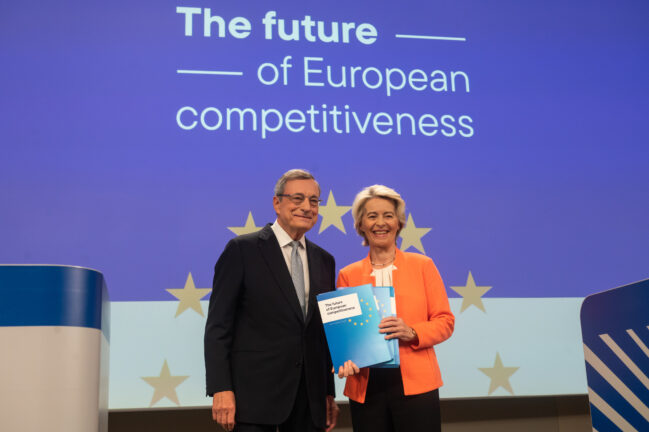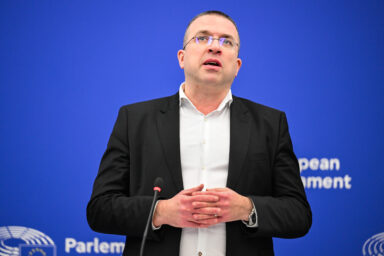September 2025 marks one year since Mario Draghi published his landmark report on the state of European competitiveness. Twelve months in, just one-tenth of his recommendations have been acted upon. “Dragging on Draghi is dangerous,” MEP João Cotrim de Figueiredo (Renew/PRT) warned.
In his famous report, former European Central Bank (ECB) chief Mario Draghi called for massive new investments, at least €750–800bn annually, to enhance Europe’s competitive position. Earlier this month, Draghi himself raised the figure to €1.2tr per year. This number supported by several independent analyses, including by his former colleagues in Frankfurt.
Translating into action difficult
Giving ear to Mr Draghi’s recommendations, the Commission put forward several proposal to reduce the regulatory burden on European businesses in the past years. On top of that, new investments have been announced, such as through the €410 billion Competitiveness Fund, a doubling of the Horizon Europe research programme budget, and additional funding for digital and clean tech.
Mario Draghi spoke of an existential threat. Faced with such a threat, you need to act quickly. — MEP Cotrim de Figueiredo (Renew/PRT)
Yet, only 11 percent of Mr Draghi’s 383 recommendations have been implemented, the European Policy Innovation Council found. MEP Cotrim de Figueiredo stressed the danger of delay. “Mario Draghi spoke of an ‘existential threat’ in the foreword of his report. And this is coming from a central banker who is used to weighing his words carefully,” he said. “Faced with an existential threat, you need to act quickly. Dragging on Draghi is dangerous.”
Few across Europe seem to disagree with the urgency of Draghi’s findings, but translating that urgency into concrete action has proven difficult. As the fierce backlash to the Commission’s recent proposal for only a modest increase in EU resources in the next multi-year budget showed, overcoming member states’ reluctance to give more commitment remains a major hurdle.
Unfinished single market
This reluctance is emblematic of the broader problem with executing many of Draghi’s recommendations. Central to his argument, as well as in the twin report by former Italian prime minister Enrico Letta, lies the single market. Three decades after its creation, Europe’s single market remains highly fragmented, and progress has largely stalled. Sixty percent of the barriers companies faced 20 years ago remain unchanged.
As Commission President Ursula von der Leyen reminded us in her State of the European Union address last week, intra-EU barriers act as the equivalent of a 44 percent tariff on goods, three times higher than trade frictions between US federal states. For services, the figure climbs to 110 percent. The lack of an integrated market remains a key obstacles for businesses to scale up within the European market.
You might be interested
The European Commission should have no higher priority than completing the single market. — MEP Jonas Fernandes (S&D/ESP)
MEP Jonas Fernandes (S&D/ESP), faction’s spokesperson on economic and monetary affairs, underlined the urgency: “When we talk about productivity or so-called competitiveness, the European Commission should have no higher priority than completing the single market, developing the new Savings and Investment Strategy, and deepening the integration of capital markets.”
Reforms clash with national interests
Showing its commitment to Draghi’s recommendation, the Commission did revive the longstanding “capital markets union”, rebranding it into the “savings and investments union”. And while much discussion has been ongoing, the Commission has not put forward any concrete proposal. Ms von der Leyen, though, noted in her State of the European Union that the Commission will present a “Single Market Roadmap to 2028”.
The lack of action can largely be attributed to the fact that various reforms are needed in other fields for markets to be integrated. But these reforms, which include, for example, insolvency law reform, are tightly bound to national interests. Many member states are often reluctant to change their existing laws and would rather see others adapt to what they already have. That makes consensus difficult and changes at EU level highly contentious.
Parliament underlines urgency
Last week, the European Parliament took a step forward by adopting a report on streamlining internal market rules. Drafted by MEP Anna-Maja Henriksson (Renew/FIN), the report calls for a stronger push toward harmonisation, enforcement, digitalisation and consumer protection. Its aim is to make the market both more predictable and more competitive.
“Strengthening the single market is the only way to boost the EU’s competitiveness and global influence,” Ms Henriksson said. “We strongly support calls in this report to make better use of public investment at national and EU levels, to help mobilise private capital and boost productivity. The issuance of a common safe asset could play an important role in addressing the significant investment gaps in the EU identified by the Draghi Report, and help facilitate the completion of our Capital markets union.”
More than integration
Nonetheless, integration alone will not do the job. In an opinion piece in The Economist, former Greek finance minister Kirakos Pierrakakis argued that the EU must go beyond simplification and build regulatory regimes designed with the future in mind. Regulation, he said, should not just be a matter of cutting red tape, but should be aligned with long-term strategic goals.
Sander Tordoir, chief economist at the Centre for European Reform, struck a similar note in an interview with the Financial Times. “Simplification is a sideshow rather than the main medication,” he said. “You can have a bonfire of regulations. But if you implement none of the other policies Draghi recommended, nothing is going to happen.”
“Massive investments needed. Now!”
Mario Draghi himself also sounded the alarm again last month. “Governments must make the massive investments needed in the future,” he warned. “And they must do it not when circumstances have become unsustainable, but now, when we still have the power to shape our future.”
Commission President von der Leyen insisted the EU is already shifting gears. “One year ago, the Draghi Report called on Europe to shift gears in the global race for competitiveness. We heard that call—loud and clear. And we responded, fast and forcefully,” she wrote on X.
This week, Ms von der Leyen will meet with Mr Draghi to take stock of the progress made.










